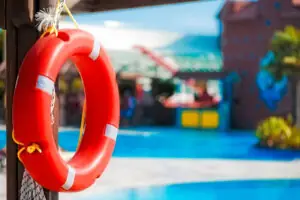
Summer is a time for fun and relaxation, but it also brings an increased risk of drowning accidents. Whether you’re spending time at a swimming pool, water park, or out on a boat, it’s crucial to be aware of the dangers and take steps to protect your loved ones. This article provides essential guidelines and legal advice to help families stay safe around water during the summer months.
Understanding the Risks
Drowning accidents are more common than many people realize. According to the Centers for Disease Control and Prevention (CDC), about ten people die from unintentional drowning every day in the United States. Children aged 1-4 have the highest drowning rates, and drowning is the leading cause of accidental death for this age group.
Swimming pools, water parks, and boating activities all present unique risks. For instance, home swimming pools are the most common site for drowning among children, while water parks can pose dangers due to crowded conditions and powerful water currents. Boating accidents often involve alcohol, lack of life jackets, and poor weather conditions. Understanding these risks is the first step in preventing tragic accidents.
Swimming Pool Safety
General Safety Tips
One of the most important aspects of swimming pool safety is supervision. Never leave children unattended around water, even for a moment. Designate a responsible adult to watch the pool area, and avoid distractions like phones or reading.
Installing physical barriers like fences and safety covers can prevent unsupervised access to the pool. Fences should be at least four feet high and have self-closing, self-latching gates. Safety covers provide an additional layer of protection when the pool is not in use.
Teaching children how to swim is another vital safety measure. Enroll your kids in swimming lessons to help them become confident and capable swimmers. However, remember that swimming lessons do not replace the need for supervision.
Safety Equipment
Having the right safety equipment on hand can make a significant difference in an emergency. Life jackets and flotation devices are essential, especially for young or inexperienced swimmers. Make sure that these devices are properly fitted and worn at all times when near the water.
Pool alarms can alert you if someone enters the water unexpectedly. These devices can be installed on doors leading to the pool area or directly in the water to detect motion.
Emergency Preparedness
Being prepared for emergencies is crucial. Take a CPR class to learn how to respond in case of a drowning incident. Quick and effective CPR can save a life while waiting for emergency responders to arrive.
Keep emergency contact numbers easily accessible, and have a phone nearby when spending time at the pool. Every second counts in an emergency, so being prepared can make all the difference.
Water Park Safety
Choosing a Safe Water Park
When planning a trip to a water park, research the park’s safety record. Look for reviews and news articles that mention past incidents or concerns. Choose a park that prioritizes safety and has a good reputation.
Ensure that the water park employs certified lifeguards. Lifeguards should be easily identifiable and stationed throughout the park, especially near high-risk areas like wave pools and slides.
Safety Tips at the Water Park
Once you’re at the water park, it’s essential to follow all posted safety rules. These rules are in place to protect you and your family. Stay within designated areas and avoid swimming in restricted zones.
Supervision is just as important at a water park as it is at home. Keep a close eye on your children, especially in crowded areas. Establish a meeting point in case anyone gets separated from the group.
Encourage your children to use the buddy system, pairing up with a friend or sibling to ensure they are never alone. This added layer of supervision can help prevent accidents.
Water parks often have areas with strong currents or deep water. Make sure your children understand the dangers and know how to navigate these areas safely. Use life jackets for younger or less confident swimmers.
Emergency Preparedness
Just like at the swimming pool, being prepared for emergencies at a water park is vital. Know the location of first aid stations and how to contact park staff in case of an emergency. Familiarize yourself with the park’s layout so you can act quickly if needed.
By following these guidelines, you can help ensure a fun and safe experience for your family at swimming pools and water parks this summer.
Boating Safety
Before You Go
Before heading out on the water, it’s crucial to check the weather conditions. Avoid boating in bad weather, as high winds and rough waters can be dangerous. Always have a plan and share it with someone who will stay onshore.
Ensure that your boat is in good condition before departure. Check for any mechanical issues, ensure you have enough fuel, and make sure all safety equipment is on board and in working order. This includes life jackets, a first aid kit, flares, and a fire extinguisher.
Safety Tips on the Water
Wearing life jackets is the most effective way to prevent drowning during boating activities. Ensure that everyone on board has a properly fitted life jacket and wears it at all times. Even strong swimmers can benefit from the added safety of a life jacket.
Avoid alcohol consumption while boating. Alcohol impairs judgment and reaction times, increasing the risk of accidents. Stay sober to ensure a safe boating experience for everyone.
Understand and follow all boating laws and regulations. This includes speed limits, no-wake zones, and rules for navigation and right-of-way. Educate yourself on the specific laws for the body of water you’re navigating.
Emergency Preparedness
Having a first aid kit on board is essential. Be prepared to handle minor injuries and know how to stabilize more serious injuries until help arrives. Familiarize yourself with basic first aid procedures and keep a first aid manual in your kit.
Know how to use distress signals and have them readily available. This includes flares, an air horn, or a VHF radio to call for help in case of an emergency. Make sure everyone on board knows how to use this equipment.
When to Hire an Attorney
After an Accident
If you or a loved one has been involved in a drowning accident, it’s important to consider legal action. Contacting an attorney as soon as possible can help you navigate the complexities of the legal system and ensure your rights are protected. Document the incident thoroughly, including taking photos, gathering witness statements, and keeping medical records.
Reasons to Hire an Attorney
Hiring a personal injury attorney in Scranton can help you navigate insurance claims, which can be complex and overwhelming. An attorney can ensure that you receive the compensation you deserve for medical expenses, pain and suffering, and other damages.
Understanding liability and negligence is crucial in drowning cases. An attorney can help determine who is responsible for the accident and build a strong case on your behalf. Whether it’s a property owner, a water park, or a boating operator, holding the responsible party accountable is essential.
An experienced personal injury attorney in Scranton can also negotiate with insurance companies on your behalf, preventing you from being taken advantage of and ensuring you receive a fair settlement.
How Long Do Cases Take?
The duration of a personal injury case can vary depending on several factors. These include the complexity of the case, the willingness of the parties to settle, and the court’s schedule. On average, personal injury cases can take anywhere from a few months to a couple of years to resolve.
An attorney can provide a more accurate timeline based on the specifics of your case and keep you informed throughout the process. Patience is important, but rest assured that your attorney will work diligently to resolve your case as quickly and efficiently as possible.
Why Choose The Moran Law Group?
Experience and Expertise
The Moran Law Group has extensive experience handling drowning accident cases. Our team of dedicated Scranton personal injury lawyers understands the nuances of these cases and can provide the expert representation you need.
Compassionate Representation
We know that dealing with the aftermath of a drowning accident is incredibly difficult. Our attorneys approach each case with compassion and sensitivity, ensuring that you feel supported throughout the legal process. We are committed to helping you achieve the best possible outcome.
Local Knowledge
As a Scranton personal injury attorney, The Moran Law Group has deep ties to the local community. We understand the unique challenges and opportunities that come with practicing law in Scranton, and we use this knowledge to your advantage.
Contact Us Today
Water safety is a critical issue, especially during the summer months. By following the guidelines provided in this article, you can help protect your family from drowning accidents. However, if the unthinkable happens, it’s important to seek legal assistance to ensure your rights are protected.
If you or a loved one has been involved in an accident on the water, don’t hesitate to contact The Moran Law Group. We offer free consultations and are here to help you navigate the legal process. Reach out to us today to discuss your case and find out how we can assist you.
